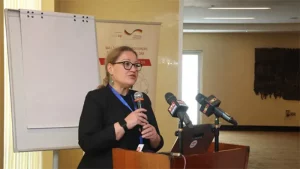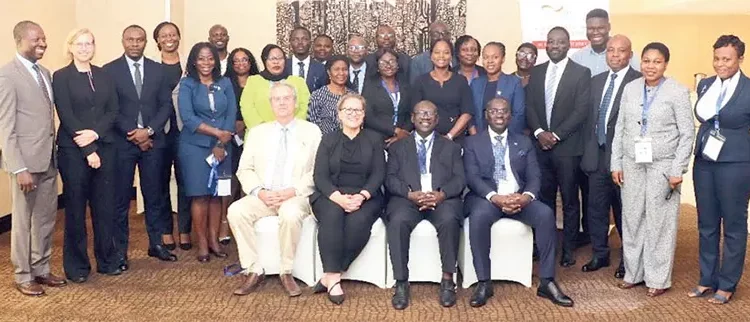Speakers and participants at the workshop
The Ghana Legal Information Institute (GhaLII), has called for an enhanced access to the law by the public in order to strengthen democracy.
According to the Institute, legislative reforms and effective policy implementation rely on transparency, public participation, and accountability.
Director of AfricanLII, Mariya Badeva, speaking at a training programme for Ghanaian legal and justice sector stakeholders organised by GhaLII in collaboration with the Deutsche Gesellschaft für Internationale Zusammenarbeit (GIZ), said when bills and enacted laws are not easily accessible to citizens, public consultation becomes limited and democracy is weakened.
“Open access to law supports Parliament’s own mandate by enabling broader citizen engagement in the legislative process. It allows civil society, businesses, and individuals to meaningfully contribute to policy discussions because they can see and understand draft legislation and regulatory frameworks,” she said.
She stated that as Ghana moves toward a more digital economy, Parliament’s committees on governance, ICT, and legal reform should champion initiatives to publish all bills, acts, and legislative histories on authoritative online platforms.
“In countries like Kenya and South Africa, legislative portals have become central to promoting trust and participation in lawmaking. Ghana has the opportunity to go further, embedding public feedback mechanisms into its digital legislative process. Open access to law provides free, public, digital access to legislation, case law, and regulations, and is critical for transparency, judicial consistency, business confidence, and citizen empowerment,” she added.

Mariya Badeva
Madam Badeva further explained that Parliament and institutions like the Bar Association and Judicial Training Institute have vital roles to play in institutionalising open access and promoting digital legal literacy.
She expressed the hope that Ghana will be a continental leader in digital legal innovation, urging stakeholders to build on current momentum and make the law accessible, authoritative, and useful for all citizens.
“With continued commitment, Ghana could soon be among the top performers on the Open African Law Index. This would not just be symbolic; it would be a tangible step toward consolidating Ghana’s leadership in digital governance and ensuring the law truly serves the people,” she said.
On behalf of the Speaker of Parliament, Alban Sumana Kingsford Bagbin, Member of Parliament (MP) for Akatsi South, Bernard Ahiafor explained that the workshop comes at a pivotal moment in Ghana’s digitalisation journey, especially with Parliament itself embracing the digital revolution.
“This workshop comes at a pivotal moment for Ghana. As our nation moves deeper into the digital age, the world around us continues to change rapidly. Parliament itself has embraced digital transformation from e-petitions that connect citizens directly with legislators to the digitalisation of our historic Hansards, making it possible for every Ghanaian to explore how past parliaments have shaped our nation,” he explained.
He further added that for this goal to take root, it needs to be a collective effort and partnerships.
“Parliament cannot stand and should not act alone. The vision we share demands a joint effort. It requires partnerships between Parliament, our judiciary, our legal professionals, academics and civil society, anchored by the technical expertise of institutions like GhaLII and the knowledge and experiences of our counterparts in other parts of Africa,” he added.
The General Secretary of the Ghana Bar Association, Kwaku Gyau Baffour, explained that the work done by AfricanLII and GhaLII is dependent on donor support, but it is not enough or a reliable source of income for access to legal information, and added that partnership with the government offers a way out of the financial dilemma.
By Vera Owusu Sarpong


